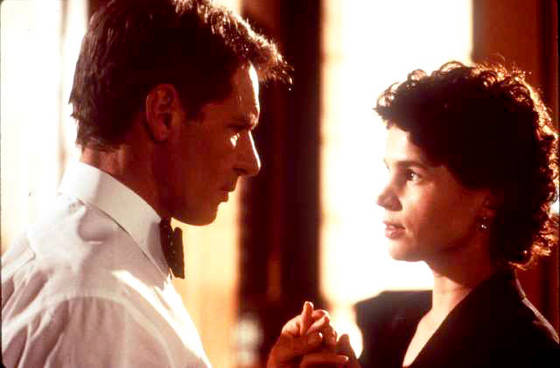From “The Conception, Production and Distribution of Julia Ormond,” David Blum’s revealing 1995 New York Times Magazine profile of a classically trained actor being packaged for a mass stardom that never materialized:
“I FIRST MEET JULIA ORMOND FOUR MONTHS earlier in November 1994. We’re having breakfast at the Parker Meridien in New York, where Paramount Pictures has put her up. She’s in town for wardrobe fittings on Sabrina, which Paramount is producing. She seems upbeat as she tries to unravel for me the mystery of her sudden change in status. She takes her time with every question, and seems intensely quizzical herself about the inescapable belief among those around her that she may soon be a movie star.
It strikes us both as odd because at the moment, almost no one in America outside the movie business has yet heard of her. Until now Ormond has only been known to those who watch the movie business closely by reading movie magazines or scanning E!, cable’s entertainment channel.
As recently as three years ago, she was an unknown actress in London. Today she is pampered by an industry with the resources to provide every necessary comfort, and several optional extras. Ormond suddenly finds herself in the back of stretch limos, and struggling over what to do with the single-stemmed, wrapped-in-plastic roses often passed her way by friendly drivers, pilots and other helping hands. She has a personal assistant, Jane Collins Emanuel, to handle her schedule, her luggage and the roses.
‘I think you’re tapping into the bizarreness,’ Ormond is saying in front of a glass of grapefruit juice that remains untouched. Will Edridge, her pleasant, sandy-haired British doctor-boyfriend, sits beside her quietly. He listens intently as her unusually well-formed thoughts spill forth. Her words betray her emotions more than her face, but there’s an underlying sense that Ormond wants to please. ‘There are too many people who are talented . . . who fulfill all the things that are needed but are not movie stars,’ she says. ‘I don’t know what happened either.’ Ormond agrees that it would be interesting for a writer to examine the process of becoming a movie star without a single major movie in release.”
••••••••••
“Once upon a time…”:

